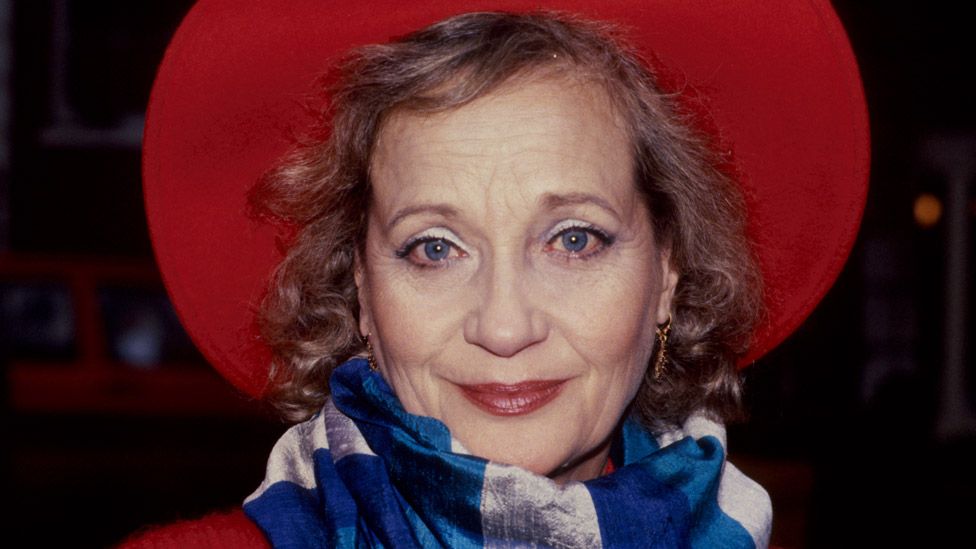ARTICLE AD BOX

British actress Sylvia Syms, a star of stage and screen for six decades, has died at the age of 89.
She shot to fame in the 1950s in Ice Cold in Alex, and was nominated for Bafta Awards for Woman in a Dressing Gown and No Trees in the Street.
Later, she was in TV shows like Peak Practice and EastEnders, and in 1991 played the former prime minister in ITV's Thatcher: The Final Days.
And in 2006 she played the Queen Mother opposite Helen Mirren in The Queen.
Image source, Pathe
Image caption,Syms (right) was a memorable Queen Mother in the Oscar-winning The Queen
A statement from her children, Beatie and Ben Edney, said: "Our mother, Sylvia, died peacefully this morning.
"She has lived an amazing life and gave us joy and laughter right up to the end. Just yesterday we were reminiscing together about all our adventures. She will be so very missed."
Image source, Ronald Grant
Syms was born in London on 6 January 1934. At the age of five, she became one of thousands of children evacuated from London moving first to Kent and then, in 1940, to Monmouthshire.
She later recalled the trauma of being separated from her mother, who was to die of a brain tumour when Sylvia was just 12.
"Sending me away from home gave me the impression I was not loved, which was unfair but it's the truth," she said. "It's why I became a performer and never stopped working."
She featured in a number of BBC productions in the 1950s
At 16, she suffered a nervous breakdown and contemplated suicide but, at the insistence of her stepmother, had psychotherapy which helped her through the crisis.
Her ambition to act led her to drama school Rada, where she received the Gerald Lawrence Scholarship and an HM Tenants Award.
Like many aspiring actors, she cut her teeth in the West End, where she understudied roles in a variety of plays as well as being part of the Apple Cart Company with Noel Coward.
Demands
But she became a victim of the British studio system, which sucked in young actors on long contracts, paid them peanuts and hired them out at exorbitant rates.
She earned just £30 a week for her first major film role, playing the part of Jane Carr in My Teenage Daughter, a gritty tale of delinquent behaviour.
A year later, she appeared in The Woman In A Dressing Gown, where she played a woman having an affair with an older man.
Image source, Ronald Grant
Image caption,She excelled as the femme fatale in The Woman in a Dressing Gown
By now she was married to her childhood sweetheart Alan Edney and balancing her film career with the demands of domesticity.
She later said marriage gave her the the stability she had missed as a child, and allowed her to use a wedding ring to fend off unwanted advances in the studio.
She purported to be unaware of her growing reputation as an actress, remarking later that the praise showered on her by directors was "because they wanted to get into your knickers".
"There was an assumption that because you were blonde and an actress you were available."
Powerful
Unlike some of her contemporaries, she showed she was as adept at handling dramatic roles as she was at playing in fluffy comedies.
In 1958, still contracted at £30 per week, she appeared in Ice Cold In Alex alongside John Mills, Anthony Quayle and Harry Andrews, all of whom were earning far more than her.
The film later gained cult status, particularly after one famous scene with three dusty soldiers and her attractive blonde nurse in a bar in Alexandria was used in a commercial for a certain Danish lager.
Image source, Ronald Grant
Image caption,The Tamarind Seed brought her a Bafta nomination
It was not until 1960, when her co-star in The World of Suzie Wong, William Holden, discovered how little she was being paid and lobbied the studio, that her earnings increased.
She gave a powerful performance as the wife of a condemned prisoner in the screen version of Brendan Behan's The Quare Fellow in 1962 and played Tony Hancock's wife in The Punch & Judy Man.
Syms appeared in some controversial films including the role as the bigot's daughter in Flame In The Streets, which earned her a ban by the apartheid government in South Africa.
But too many of her films in the 1960s were in run-of-the-mill studio fillers, denying her the chance to show her full ability as an actress.
Memorable
She had already turned down the chance to go to Hollywood, preferring to stay in England with her husband and two children.
The 1974 film The Tamarind Seed saw her playing the wife of a gay diplomat, a role that earned her another Bafta nomination.
While she continued to appear in a host of films, this was the high-water mark of her cinema career.
But she kept working, with roles on stage, film and television, including her memorable performance as Margaret Thatcher.
In EastEnders, she had a recurring role as dressmaker Olive Woodhouse. She also appeared in an episode of BBC One drama series Gentleman Jack in 2019, and was in BBC Two's gentle religious comedy Rev in 2011.
Syms was a gifted actress who, unlike many of her contemporaries, possessed the drive and talent to maintain her career for 60 years.
Some felt she deserved more recognition for her achievements. She did get an OBE, but that was for her charity work rather than her acting.
"I'm not dame material really," she said in an interview with the Guardian. "An Oscar's very useful if you want to be a dame."
If she had not turned down the opportunities to experience the bright lights of Hollywood, she might have achieved the international fame that eluded her.

 2 years ago
55
2 years ago
55








 English (US) ·
English (US) ·